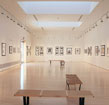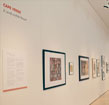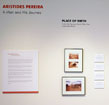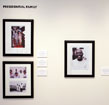
Exhibitions: Current | Upcoming | Past
Exhibitions: Past
Aristides Pereira: A Man and His Journey
Cape Verde: A Land and its People
Photographs by Ron Barboza
November 8 – December 14, 2012








We are pleased to present this collection of photographs by Ron Barboza. Barboza began to photograph Cape Verde during a trip he made in 1975. He continues to document the islands and his images reveal a land and a people through a time of transition toward independence.
Cape Verde is an archipelago or island chain almost 400 miles west of Senegal, West Africa. The islands were discovered, uninhabited, by Portuguese explorers in 1456. Before that time, the islands were probably visited by fisherman and explorers and they are mentioned in various folklores throughout history.
The islands' total landmass is about the same as that of Rhode Island but is scattered over a broad region of the Atlantic Ocean. The prevailing winds and their proximity to the major trade routes between Europe, Africa, and the Americas created a diverse population. It prospered, in part, as a hub of the transatlantic slave trade. Over time the wealth and relative isolation of the islands made them vulnerable to pirating. By the 19th century, as a result of continued sacking and a slow but steady global shift away from the slave trade, the islands fell into decline.
Periodically, the islands' population also suffered from drought and famine and, eventually, this, together with the cycling effects of economic prosperity followed by decline, spurred the exodus of many Capes Verdeans to New England.
Mr. Barboza's family settled in Massachusetts around the beginning of the 20th century. In the mid 1970s, he returned to the islands to photograph the homeland of his ancestors. That first trip was followed by several more, and over the next two decades he shot more than 50,000 photographs, many of them powerful images that reflect the life and culture of the great people of Cape Verde. During this odyssey Mr. Barboza found himself at the center of the struggle for independence from African Colonialism, and he documented the life and the rise of Aristides Maria Pereira who became the first president of an independent Cape Verde.
Cape Verde continues to evolve and define itself, and we hope that Mr. Barboza will continue to capture images of the land and its people.
Kathleen Hancock
Director
Artist
Ron Barboza was born on August 23, 1946 in Providence, Rhode Island. He is the second of eight sons born to Cape Verdean-American parents and raised in New Bedford, Massachusetts.
Around the turn of the 20th century all four of Mr. Barboza's grandparents came to America from the archipelago of Cape Verde and settled in Massachusetts. His paternal grandfather came from the Island of Fogo, while the remaining three grandparents were born on the tiny Island of Brava, Cape Verde Islands. The family's connection with Cape Verdean Culture and the islands remains strong.
"I believe that my photographic work on Cape Verde gives my life a truer sense of purpose and direction. Through my work, I attempt to bring images that convey a sense of truth that will serve to enhance the beauty of our people and the islands we come from."
Between 1976 and 1995, Mr. Barboza's personal crusade took him across his ancestral homeland on nine occasions. During that period he shot over 50,000 images of life on the Islands of Cape Verde. These images have been displayed in numerous exhibitions throughout the United States and Europe.
"It's important for me to be able to show others the richest of our culture and the role we played in history. We are proud people, with a rich history."
To this end he published, A Salute to Cape Verdean Musicians and Their Music and two Cape Verdean Coloring books. His work has also appeared in publications such as Essence, Island Magazine, Black Elegance, Fandata, and Revue Noire. In 1998, Mr. Barboza organized the first ever Cape Verdean Film Festival, which took place in New Bedford, Massachusetts.
In 2011 Mr. Barboza contributed photographic images to the Hello, Cape Verde Event in New Bedford, Massachusetts. And through Mr. Barboza's company, Barika Photography, he continues to serve the community by photographing family portraits, city events, and weddings.
"My work not only brought me closer to my heritage, but it also connects me spiritually to my cultural roots. I have attempted to bring to the Cape Verdean-American Community and others the unadulterated images of Cape Verde. My vision is to raise the level of consciousness, of the very existence of Cape Verde."
He goes on to say,
"I have come to realize that photographing and researching Cape Verde is my "life's work" and through that effort I hope that I can in some small way spread the appreciation of the Islands."
Mr. Barboza holds a Bachelor of Science Degree in Physical Education from Morgan State College (1969), which he attended on an athletic scholarship. He is the husband of Helen (Gomes) Barboza and they have four children: Ronald Richard Jr., Barika Lillian, Bianca Christina, and Adia Kendra.

